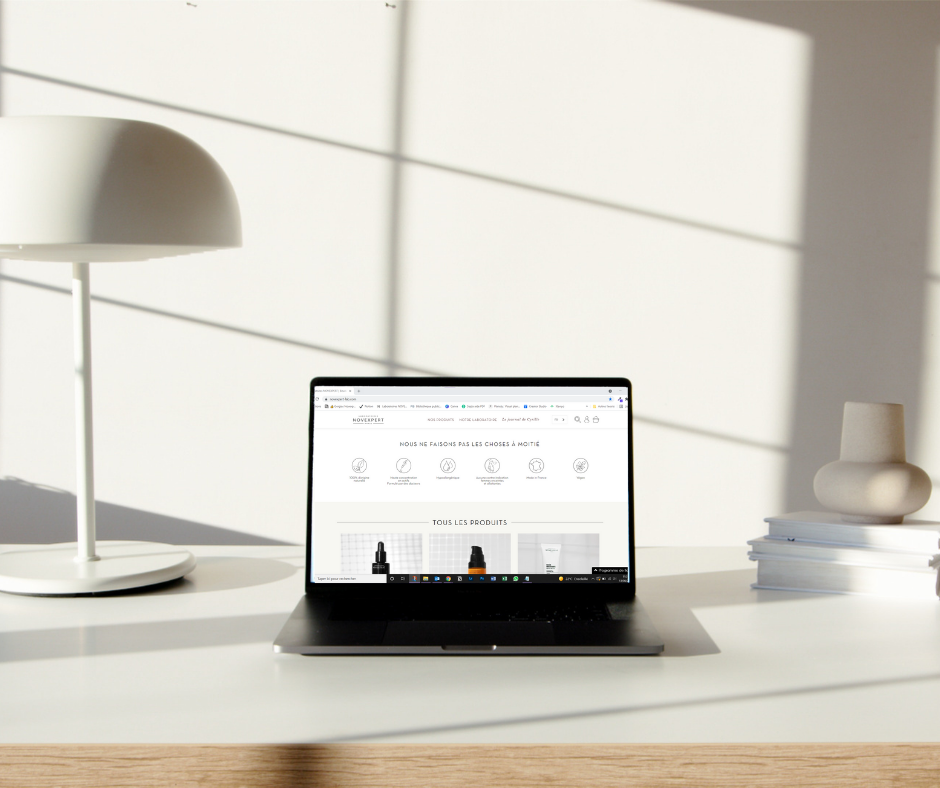Bagaimana untuk mencari jalan anda di dalam hutan jenama kosmetik?
Anda dijual mimpi, tetapi anda tidak lagi naif!
Tanpa mengenepikan kriteria 'emosi' kita, kita semua telah memerhatikan bahawa pendekatan rasional dalam memilih penjagaan kulit kini menjadi kebiasaan:
- Pilihan yang terlibat (organik yang diperakui, vegan, dsb.)
- Pilihan untuk kesihatan (hypoallergenic, tanpa bahan kontroversi, dsb.)
- Pilihan untuk keberkesanan (% aktif, keputusan klinikal, dsb.)
Tetapi apakah alat yang anda ada untuk membuat pilihan yang tepat? Izinkan saya memberitahu anda: malah perkhidmatan pemasaran kebanyakan jenama tidak memahami apa yang mereka jual. Itulah yang saya perhatikan apabila saya mengetuai makmal formulasi untuk jenama sebelum mencipta Novexpert. Jadi di manakah anda mencari maklumat yang betul untuk menggunakan jenama penjagaan kulit?
Akhirnya, persoalannya bukan lagi mengenai jenama yang anda pilih tetapi mengapa anda memilihnya ! Dan itu mengubah segala-galanya.
Anda akhirnya menjadi pelakon!
Saya tidak lagi suka perkataan 'transparency' sekarang kerana ia digunakan secara berlebihan. Tetapi saya harus mengakui bahawa terima kasih kepada keperluan baharu ini, pengguna telah mendorong syarikat untuk berkomunikasi secara berbeza! Hari ini, anda bukan sahaja melihat manfaat produk tetapi juga sama ada jenama itu merangkumi nilai yang sesuai dengan anda. Sedikit seperti pilihan raya: anda diberi program pilihan raya (organik, semula jadi, ekologi, buatan Perancis...) dan anda membuat pilihan!
Dan untuk membuat pilihan, anda telah menjadi penyiasat sebenar kehidupan seharian dengan profil yang berbeza:
Profil Penyiasat No.1: Yang Tidak Sabar
|
|
|
YUKA : dengan 21 juta peminatnya, ia penting: komprehensif (makanan & kosmetik), ia adalah aplikasi dengan komitmen yang kuat dan pendapat yang jelas. INCI BEAUTY : Ia adalah aplikasi yang paling celik teknologi dengan tapak web yang sangat jelas. Di sini juga, aplikasi mengambil pendirian dengan penilaian dan warna yang menghukum formula yang kurang 'berbudi'. CLEAN BEAUTY: Dengan aplikasi ini, anda tidak mengimbas kod bar tetapi senarai ramuan (kadangkala tidak begitu mudah dengan tiub...). Anda kemudian mendapat maklumat tentang bahan-bahan: pengganggu endokrin, agen perengsa, dsb. dengan bukti saintifik untuk menyokongnya. QuelProduit : Aplikasi yang direka oleh majalah Que Choisir. Ia menggantikan QuelCosmetic versi sebelumnya kerana ia kini termasuk makanan dan produk isi rumah. Ia bertujuan untuk menentukan tahap risiko mengikut umur dan sama ada produk dibilas atau tidak. Pendiriannya terhadap molekul kontroversi lebih diukur dan hanya merangkumi mereka yang mempunyai konsensus saintifik yang mantap. |
 |
|
CosmEthics : Kedudukan yang sangat jelas mengikut 3 kategori (selamat, risiko alahan atau risiko toksik) - juga boleh diperibadikan berdasarkan alahan peribadi anda contohnya. Pangkalan data masih tidak begitu luas. MIREILLE : Apl baharu (berbayar) yang disediakan oleh ahli biologi dan YouTuber yang turut membolehkan anda menganalisis penjagaan kulit anda, ramuan mengikut ramuan. Di sini, produk tidak dinilai tetapi komponennya! Alternatif yang dinilai lebih 'semula jadi' juga boleh dicadangkan kepada anda. |
|
Profil Penyiasat No. 2: Yang Dimaklumkan!
|
|
|
EWG (Kumpulan Kerja Alam Sekitar) ialah institusi sebenar di AS dan membolehkan anda mengetahui segala-galanya tentang ramuan dalam penjagaan kulit anda: https://www.ewg.org/skindeep/ . Anda juga boleh mengakses penerbitan saintifik pada setiap bahan aktif. Perkara berat... Sayang sekali persatuan ini, yang juga menawarkan penilaian lengkap formula, hanya meliputi kosmetik yang dijual di AS. |
 |
|
Buat masa ini, tidak ada yang setara dengan Perancis (memanggil semua usahawan!), tetapi Observatoire des cosmétiques menawarkan pelanggannya kemungkinan untuk mencari bahan dan memperoleh pengetahuan terkini serta produk kosmetik yang mengandunginya. Anda juga mempunyai La vérité sur les cosmétiques yang menyediakan pangkalan data tentang ramuan dan terutamanya editorial dan ujian produk yang mencerminkan kemerdekaan sebenar. Akhir sekali, saya akan menambah https://cosmeticobs.com/fr/: tapak khusus, untuk pakar dan sangat dihargai oleh pemain industri kecantikan. Langganan premium yang sangat komprehensif. |
|
Profil Penyiasat No. 3: Stroller
|
|
|
Pengaruh adalah sumber yang kurang kering, lebih mesra, dan membenarkan penemuan 'permata'. Dan dengan syarat beberapa mengendalikan ironi dengan kecemerlangan, ia menjadi keseronokan sepenuhnya. Saya meninggalkan anda 'tugas' untuk mengenal pasti, mengikut kriteria anda, mereka yang akan menghilangkan dahaga anda untuk maklumat dengan menjejaki, sudah tentu, mereka yang mematuhi undang-undang dompet. Petunjuk kecil tentang kemerdekaan mereka: jika mereka bercakap juga tentang jenama yang tidak dikenali sebagai jenama bersejarah dengan sedikit nada kebebasan yang berani dikritik, maka itu adalah petanda yang baik. |
|
Profil Penyiasat No. 4: Rasional
Alatnya: pakar
Sasarannya: pakar dermatologi dan pakar naturopath
Saya belum menyebutnya lagi, mungkin itu mengejutkan anda apabila, ternyata, mereka adalah yang terbaik sebagai pakar kulit. Tetapi begitulah, hanya beberapa jenama yang membiayai pelawat perubatan untuk mempromosikan produk mereka dan tidak dapat tidak pengetahuan mereka tentang tawaran kosmetik adalah terhad. Nasihat saya? Tunjukkan kepada pakar dermatologi anda tentang penjagaan kulit yang anda gunakan (dengan bekas yang mengandungi senarai ramuan) supaya mereka boleh menasihati anda. Nasihat yang sama untuk pakar naturopath anda yang boleh membimbing anda dengan syarat formula itu semula jadi.
Dan jenama kemudian? Adakah mereka akhirnya tidak mempunyai apa-apa untuk dikatakan?
Oh ya, tetapi mereka telah, sebahagian besarnya, menjadi... tidak dapat didengari! Adakah anda mendapati saya teruk? Semalam, juara silikon dan kimia keras, hari ini, mereka berjanji untuk menyelamatkan dunia... Sebelum ini, mereka mengejek 'kosmetik bersih' tetapi kini mereka menyertai mereka tanpa segan silu (dalam ucapan sahaja). Ia berbau seperti oportunisme atau ketakutan panik ditinggalkan oleh pengguna yang mempunyai ingatan dan akal! Untuk melihat dengan lebih jelas dalam keriuhan kosmetik ini, berikut adalah dua nasihat terakhir saya:
1 / KOMPAS BUKANNYA BILANG CUACA : pastikan 'kedudukan' jenama tidak berubah selama beberapa tahun, yang mencerminkan keyakinan yang mendalam.
2 / FAKTA BUKAN PERKATAAN : fokus pada kandungan komunikasi mereka. Ia mesti jelas. Contohnya, untuk keaslian, jumlah peratusan formula yang perlu dipaparkan dan badan yang memperakui harus disenaraikan. Dan ini, untuk semua produk jenama tanpa pengecualian...
Selamat menyiasat kepada semua dan hubungi kami jika anda menemui permata (petunjuk: anda tidak perlu meneroka terlalu jauh...).


